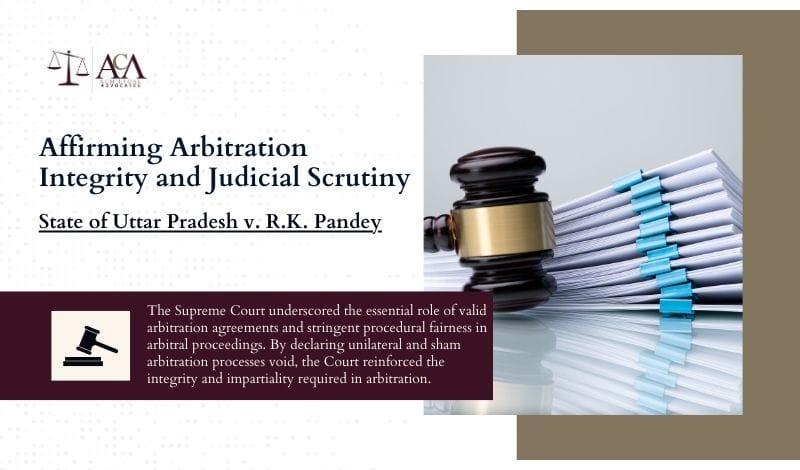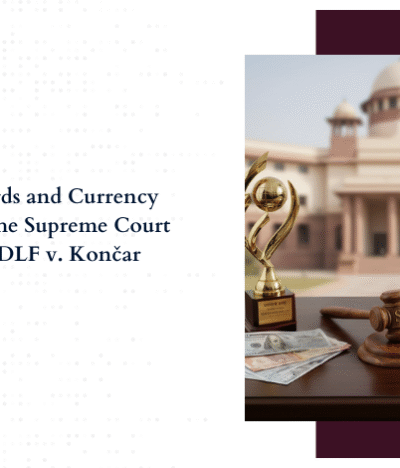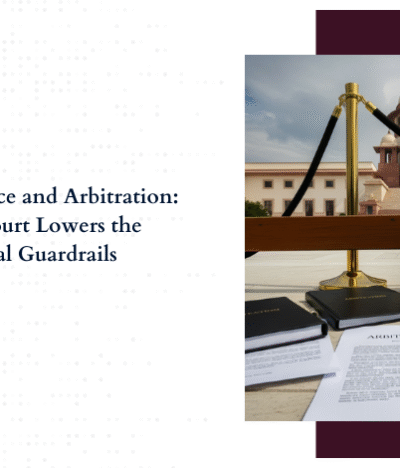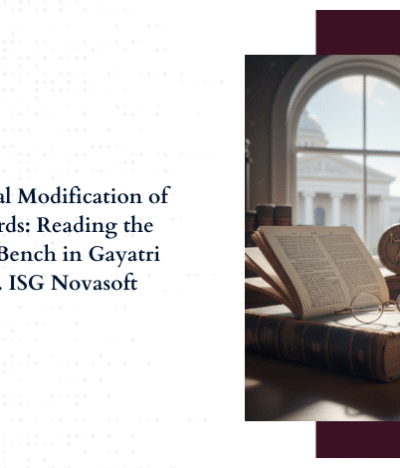State Of Uttar Pradesh And Another Versus R.K. Pandey And Another 2025 INSC 48
Fraud and justice cannot coexist. The Hon’ble Supreme Court in the present judgment has emphasized the importance of party autonomy in arbitration and highlighted that arbitration agreements are a sine qua non i.e. an essential condition for valid arbitral proceedings. The judgment underscores that fraud vitiates all proceedings, especially in arbitration where fairness and impartiality are crucial. The Hon’ble Supreme Court reiterated that unilateral appointments of arbitrators and sham arbitration agreements cannot stand the test of judicial scrutiny.
The judgment is significant for highlighting the importance of valid arbitration agreements, procedural fairness, and the necessity of impartiality in arbitral proceedings. This article aims to provide a detailed analysis of the judgment, the key precedents cited, and its broader implications on arbitration law in India.
Brief facts of the case:
Respondent no. 1, R.K. Pandey was appointed as a Lab Assistant/Technician at the Dina NathParbati Bangla Infectious Disease (DNPBID) Hospital in Kanpur. The hospital, initially established by the Municipal Board of Kanpur, was transferred to the State Government of Uttar Pradesh in 1956 through a transfer deed executed in 1961.
The said Transfer Deed stated that the entire municipal staff of the hospital will stand transferred to the State Government service. The staff will not be unfavourably placed as regards emoluments or other service conditions, nor shall they suffer in the matter of emoluments, leave, age of retirement, and other benefits as compared to the terms of service of the Board.
After the settlement was executed, it was agreed that the concessions and privileges enjoyed by the staff before the aforesaid hospital were provincialized will continue in future and they will not be put to a disadvantage by the takeover.
Through a letter dated 09.01.1997, the Respondent no. 1 was informed by the hospital’s Chief Medical Superintendent that Respondent no. 1 would retire on 31.03.1997. Disputing the retirement age, the Respondent no. 1filed a Writ Petition before the Hon’ble High Court of Judicature at Allahabad claiming that he should retire at the age of 60 years instead of 58 years, relying upon the service rules as applicable to the employees of the Municipal Board of Kanpur. The said Petition was later withdrawn.
During the pendency of the Writ Petition, Respondent No. 1filed an Arbitration Suit before the Ld. District Judge, Kanpur Nagar, Kanpur, relying upon an alleged Arbitration Agreement dated 01.04.1957 between the then Administrator of the DNBPID Hospital and the Governor of Uttar Pradesh. The prayer sought was for the dispute regarding Respondent No. 1’s age of superannuation. Subsequently, Respondent No. 1 withdrew the suit seeking to refer the disputes to arbitration. On 29.11.2008 he filed execution petitions before the Ld. District Judge in Kanpur, seeking enforcement of the awards, which were granted by the trial court and upheld by the Hon’ble High Court.
The impugned judgment passed by the Division Bench of the High Court of Judicature at Allahabad dismissed the intra court appeal on the grounds that the objections of the Appellants itself were barred by limitation and beyond the condonable period.
Hence, the Appellants challenged the authenticity of the arbitration agreement and the awards before the Hon’ble Supreme Court, leading to the present judgment.
Issues involved in the case:
Issues involved in the case are whether the arbitration agreement relied upon by Respondent No. 1 was valid and enforceable; whether the unilateral appointment of arbitrators and further their passing of the ex-parte awards were valid.
Analysis:
The Hon’ble Supreme Court set aside the subject matter of the appeal and both the Awards as null and void and non-enforceable in law and the Execution proceedings as dismissed. The Hon’ble Court noted that arbitration proceedings require a valid arbitration agreement, impartial appointment of arbitrators, and adherence to procedural fairness. The Hon’ble Court found that the alleged arbitration agreement was neither part of official records nor was produced in original nor was the Respondent No. 1 a signatory or a party to the said Arbitration Agreement. The absence of a valid arbitration agreement rendered the arbitration proceedings null and void. Citing BilkisYakubRasool v. Union of India and Others (2024) 5 SCC 481, the Hon’ble Court reiterated that fraud vitiates all proceedings, stating that a litigant should not be allowed to benefit from a fraud practiced to secure an illegal benefit.
Although Section 7 of the Arbitration and Conciliation Act broadly defines an arbitration agreement to include claims and defenses where its existence is alleged and not denied, both the Municipal Corporation and the State of Uttar Pradesh have not acknowledged such an agreement. Further, the transfer indenture dated 20.06.1961 contains no reference to any arbitration agreement. The only document suggesting its existence is an uncertified and unauthenticated copy, raising doubts about its authenticity. Furthermore, it is unclear how Respondent No. 1 obtained this document nearly after 10 years of his retirement and subsequent filing of a writ petition.
The Hon’ble Court also highlighted the issue of unilateral appointment of arbitrators. The alleged arbitration agreement provided for both parties to nominate arbitrators; however, Respondent No. 1 unilaterally appointed arbitrators without notifying or obtaining consent from the other parties. This unilateral action, the Hon’ble Court held was contrary to the principle of party autonomy and procedural fairness in arbitration. Referring to the observation made by a 5-Judge Constitution Bench of the Hon’ble Court in Central Organisation of Railway Electrification v. ECI PIC SMO MCPL (JV) (2024 INSC 857), it was emphasized that impartiality and independence of arbitrators are essential for the integrity of arbitration proceedings.
The enactment establishes a procedural framework to regulate the composition of arbitral tribunals and the conduct of arbitration proceedings. This framework ensures that tribunals, supported by courts, act objectively and exercise their discretion judicially, free from arbitrariness, while adhering to legal principles and natural justice. This procedural safeguard forms the foundation of the alternate dispute resolution mechanism, particularly emphasized in Section 18 of the A&C Act, a mandatory and non-derogable provision.
The Hon’ble Court further noted that Respondent No. 1’s claims were barred by limitation under Section 3 of the Limitation Act, 1963, read with Section 43 of the Arbitration and Conciliation Act, 1996. The initiation of arbitration proceedings years after his retirement without reasonable cause was considered an undue delay.
Another critical observation made by the Hon’ble Court pertained to the lack of subject matter jurisdiction. The arbitral tribunal must have jurisdiction over the dispute, which, in this case, was absent due to the fraudulent nature of the arbitration agreement. The Court referred to Section 47 of the Code of Civil Procedure, 1908, which allows parties to object to the execution of a decree on grounds of fraud and jurisdictional issues, even at the stage of execution proceedings.
Conclusion
The Hon’ble Court observed that the arbitration proceedings were a mere sham and a fraud played by Respondent No.1, R.K. Pandey, by self-appointing/nominating arbitrators, who have passed ex-parte and invalid awards. Further in the light of the above observations the Hon’ble Supreme Court set aside the subject matter of the appeal and both the Awards as null and void and non-enforceable in law and the Execution proceedings as dismissed and further underscored the importance of maintaining fairness and impartiality in arbitration. The judgment reinforces the principle that arbitration must be conducted based on a valid agreement and within the boundaries of law and procedural fairness.






